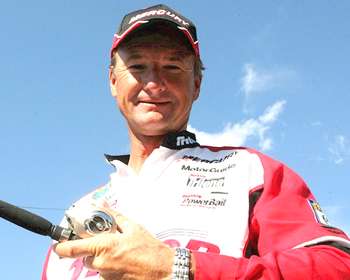
In three decades of casting for cash, Gary Klein has seen it all. He's seen anglers go through a key area and catch just about every catchable fish. He's also seen them fail to adjust to the prevailing conditions — failure to "fish the moment," in the current jargon — and that's when he thinks he can go back through an area and pick up the crumbs others have left behind.
Often the variable that others fail to adequately consider is lighting: how it affects the positioning of the fish and how aggressively they'll feed. Klein says there's no one-size-fits-all rule here. "It's a broad topic," he advises, but there are certain basic premises that tend to hold true more often than not. "On real bright, sunny days, bass have a tendency not to travel quite as far to get to your lure," Klein says.
"Sunshine to a fish is lack of security. Darkness is security." He doesn't fix his light meter at the beginning of the day and fish all 8 or 9 hours of the tournament accordingly. Instead, Klein is constantly on the lookout for slight changes, and he'll adjust as the moment demands. "If the water is clear or the sun breaks out, I'm going to start looking more for targets or cover," he says. "If it's cloudy and overcast, I feel like I can cover the water a little bit quicker."
In overcast conditions, Klein believes that precision casting isn't as important as when the sun pushes the bass against the cover. Klein points out that when conditions are dreary, the bass will move at a moment's notice. "You get a little bit of breeze and a few clouds moving in and all of a sudden you've got a topwater bite going on," he suggests. "Under bright sunshine, you couldn't get a bite on topwater to save your rear, but you pull out a crankbait and you start catching them.
It's a matter of depth. We're catching the same fish under different conditions using different tools." He also believes that just because a certain condition exists doesn't mean that it's not subject to change for a wide variety of reasons. Light conditions don't affect each member of the school the same way. Furthermore, boat traffic and other distractions can make previously aggressive fish much more cautious. So while cloud cover might suggest that the bass will be roaming and active, once he picks off the most active feeders there may still be other fish that are susceptible to getting caught.
"I don't care if it's sunny or cloudy, everything changes," he says. "If I pull up on a spot, I'm going to start changing the spot because I'm going to catch the fish that are actively feeding. I may have to change up my tools. If I'm catching 15 in a row and then suddenly the bite stops — and I know everything is still right and the fish are still there — I might pick up a shakey head or a Carolina rig or slow roll a spinnerbait. Anything I can do to catch 10 or 15 more."
Ultimately, a lot of the adjustments necessary to "fish the moment" are mental. If an angler remains convinced that there are fish in a given area, he'll keep pounding the water with adjustments, both large and small, until he finds the combination to the lock. "The worst person for me to fish behind is myself, because I feel that I have the knowledge and the ability with my techniques so that I'm pretty thorough," Klein says. "So I won't double back over something unless I'm sure there's a good concentration of fish there and I feel like I didn't catch them all, or I didn't catch the biggest ones. Normally, I don't like to re-fish an area. I'll jerk the trolling motor up, go somewhere else and come back the next day."





